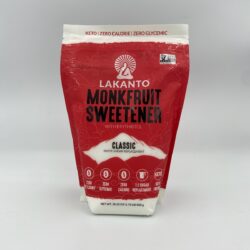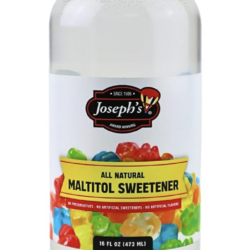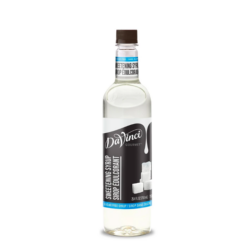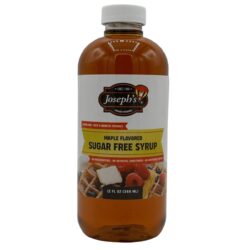The Sweet Lowdown on Sugar Alcohols and Monkfruit: What Newcomers Need to Know 🧁
Starting a sugar-free lifestyle is an exciting journey, but it can come with a few surprises—especially when it comes to sugar alcohols and other alternative sweeteners. These low-calorie options, like erythritol, xylitol, sorbitol, maltitol, and monkfruit sweeteners, are great for satisfying your sweet tooth without the sugar crash. However, they can affect people differently, especially when you’re just getting started.
Here’s what you need to know:
Start Small: Everyone’s tolerance to sugar alcohols varies. It’s best to try them in small amounts to see how your body reacts. Some sweeteners, like erythritol, are generally gentler on the stomach, while others, like maltitol, may cause bloating or discomfort if overdone. Monkfruit sweeteners are a natural option that is generally well-tolerated and won’t cause digestive upset for most people.
Build Tolerance Over Time: If you experience side effects like gas or stomach discomfort from sugar alcohols, don’t worry—it’s common! Many people find that their tolerance improves as their body gets used to these sweeteners. Monkfruit, on the other hand, can often be enjoyed without much adjustment.
Experiment: Not all sugar alcohols and sweeteners are created equal. What works for one person may not work for another. Experiment with different options to find the ones that suit your taste and digestion best.
Listen to Your Body: Pay attention to how you feel after eating sugar-free foods. If you’re experiencing stomach upset, it might be a clue to adjust your choices or portion sizes.
Switching to a sugar-free lifestyle should be empowering, not uncomfortable. By understanding how sugar alcohols and monkfruit sweeteners work and taking it slow, you’ll be able to enjoy delicious sugar-free treats without the unpleasant surprises.
Sugar Alcohols Ranked by Digestive Impact
Sorbitol
Likelihood of Discomfort: High—often associated with bloating and gas, even in small amounts.
Pros: Inexpensive and adds sweetness to a variety of products.
Cons: Ferments in the large intestine, which increases the likelihood of digestive issues.
Mannitol
Likelihood of Discomfort: High—similar to sorbitol, tends to cause intestinal distress at lower thresholds.
Pros: Useful for creating a cool mouthfeel in products like gums and mints.
Cons: Can be problematic for sensitive stomachs.
Maltitol
Likelihood of Discomfort: Medium to High—it can cause bloating or diarrhea if consumed in larger amounts.
Pros: Closely mimics the taste and texture of sugar, making it great for candies and chocolates.
Cons: Only partially absorbed, leading to fermentation in the gut.
Xylitol
Likelihood of Discomfort: Medium—may cause issues if consumed in large quantities but generally tolerable in small servings.
Pros: Great for dental health, as it can reduce cavities.
Cons: Digestive effects vary from person to person.
Erythritol
Likelihood of Discomfort: Low—mostly absorbed in the small intestine, leaving minimal residue to ferment in the gut.
Pros: Very gentle on digestion, low in calories, and has a clean sweet taste.
Cons: Can cause mild bloating if consumed in excessive quantities.
Monkfruit Sweeteners (blended with erythritol or other carriers)
Likelihood of Discomfort: Very Low—generally well-tolerated, especially if used in moderation.
Pros: Natural, calorie-free sweetness without digestive distress for most people.
Cons: Pure monkfruit can be expensive, and blends may contain carriers that affect tolerance.
Sucralose
Likelihood of Discomfort: Very Low—typically easy on digestion and doesn’t ferment in the gut.
Pros: Calorie-free, heat-stable (great for cooking and baking), and much sweeter than sugar.
Cons: It’s an artificial sweetener, which may not appeal to those who prefer natural options. Some people don’t like its aftertaste.
Understanding the nuances of sugar alcohols and sweeteners like monkfruit is key to embracing a sugar-free lifestyle comfortably and confidently. While each person’s tolerance may vary, starting small, experimenting, and listening to your body are the best ways to find what works for you. Whether you’re exploring options like erythritol for its gentle digestion or maltitol for its indulgent texture, the journey is all about discovering sweet solutions that fit your needs. With knowledge as your guide, you can enjoy sugar-free treats without any surprises—making your transition to a sugar-free diet as rewarding as it is delicious! 🍬




